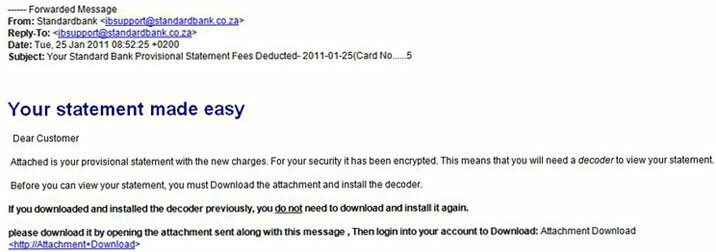03 / Computer: Email Phishing
There isn't a week that goes by that I don't get an email that looks like it came from my Bank or SARS or some online retail store requesting that I update my details by clicking a link or filling in a form or something similar.
These emails are just a trick by some phoney scammer trying to get me to disclose my personal or financial info.
Basically they want info that will lead them to my MONEY(what little I have anyway).
Now all these emails look legit, but its just another scam known as "Phishing".
Below is a example of a phishing email. They always address you as Sir/Madam/Client or Customer, emails that really do come from your bank will address you by name. There is always some kind of verification that needs to take place for some new security measure that is being put in place and you need to click a link and follow it to a webpage that looks identical to your banks where you are then instructed to input all your details to “confirm” your account eg, bank account number, PIN, ID number, OTP number, etc. Once they have all your details they use this to gain access to your bank account.

Another example.
In this one you are instructed to download an attachement to view some bogus statement. The attachment contains malware (malicous software) which will install a keylogger on your pc that will capture all your keystrokes, including when you next login to your banking site, the scammers will then use this info they get from the keylogger to gain access to your bank account.

What to look out for in Phishing Emails
The email never addresses you by your name.
Read the email carefully and check for spelling mistakes and bad grammar.
There is always some kind of security threat that you need to address now.
The email requests personal info eg. Account details and PIN number etc.
How to stay safe
Never access your banking site through a link in an email, always type the address in the address bar at the top of your browser.
Remember your bank will never ever ask you to send them your account number and PIN number in an email.
Never download any attachments that come with emails that look suspicous and make sure you have a anti virus installed as it normally detects malware in attachments.
If you not sure about an email give your bank a call and ask them.
If you think you may have fallen victim to this kind of scam call your bank immediately.
Important Numbers
Absa - Fraud Hotline
FNB – Fraud Prevention Numbers
Standard Bank - Customer Care Line
Nedbank - Contact Centre
International dialling:
To report lost and stolen cards or a suspicious or fraudulent transaction
International dialling:

